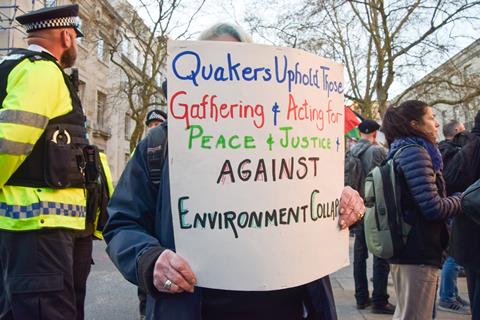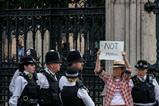The heavy-handed police raid on a Quaker meeting house should be a wakeup call to anyone who cares about freedom of religion or expression, says Symon Hill

When police smashed open the door of the Westminster Quaker Meeting House last week, they kicked another dent into our civil liberties and religious freedom.
As a Christian seeking to follow Jesus’ teachings, I believe that Christians should be concerned with the needs and freedoms of all our neighbours. We are not called to defend our own rights while ignoring those of others. Nonetheless, I hope that the police’s attack on a place of worship will be a wake-up call to those who are in denial about the suppression of peaceful protest in Britain.
What happened?
At about 7:15pm on Thursday 27 March, at least 20 police officers broke down the door of Quaker meeting house in London when they could have just rung the doorbell.
Police officers, some armed with tasers, charged into a room where the nonviolent protest group Youth Demand were holding a welcome talk. Women in their late teens and early 20s were grabbed and handcuffed behind their backs.
In the 17th century, arrests at Quaker meetings were common
Police swarmed through the rest of the building, entering a room that had been hired by a life drawing class and even a room where a private counselling session was taking place. The building is also the home of two Quaker wardens.
They reportedly used the Police, Crime, Sentencing and Courts Act 2022 as they arrested six women, the youngest of whom was 18.
When these anti-protest laws were introduced by the previous Conservative government, we were told they would be used only in extreme situations. The act was maintained by their Labour successors, and that promise is now as broken as the meeting house’s door.
Fear for the future
Having recently sued Thames Valley Police for unlawful arrest, I am not naïve about police behaviour. But news of the Quaker raid has left me even more frightened about the way things are going.
The Metropolitan Police justified their actions by pointing to Youth Demand’s plans for civil disobedience. But the event they invaded was a welcome meeting, open to people who were simply interested in Youth Demand. In implying that this was some sort of high-level planning meeting, police are either alarmingly ignorant or wilfully misleading.
Members of Youth Demand feel driven to nonviolent civil disobedience by the UK government’s continued supply of weapons and military support to Israeli forces killing civilians in Gaza. As one of the arrested women, Ella Taylor, put it after her release from custody: “We’re talking about entire generations obliterated with the backing and arms and trade of our government”. Far from promoting violence, these people are resisting violence.
I suspect that the thuggery in uniform was intended to intimidate Youth Demand supporters into abandoning their protests. The publicity generated by the raid may have the opposite effect. Hours later, Quakers in Britain condemned the “aggressive violation of our place of worship”.
A history of arrest
Quakers – also known as the Religious Society of Friends – grew out of Puritan movements in mid-17th century England. Believing that everyone can experience Jesus directly without a professional clergy or set liturgy, the early Quaker leader George Fox declared: “Christ has come to teach his people himself”.
Quakers refuse to separate sacred from secular. They do not believe their buildings to be more sacred than others. However, they do want their buildings to be places of safety and welcome. It is irrelevant that the arrested individuals were not Quakers. As a result of the raid, Quakers may no longer be able to assure people that their buildings are safe places.
Implying this was some high-level planning meeting is ignorant or wilfully misleading
When I moved to London 20 years ago, the Westminster Quaker Meeting House was a place of welcome and community to me. I have since moved away, and now belong to a Baptist church, but I am still influenced by Quakerism - and Westminster Meeting House holds a special place in my heart.
In the 17th century, arrests at Quaker meetings were common. In 1661, Charles II suppressed meetings of groups including Quakers and Baptists, who were seen as hostile to Royalist government. The Quaker Act of 1662 banned more than five adults from meeting together for worship.
Yet, however many were imprisoned, meetings still happened. In Reading, Quaker children held meetings for worship after the adults were arrested. When the authorities demolished Horsleydown Quaker Meeting House, local Quakers met for worship the next day amid the ruins.
Violation
I am not suggesting that the situation is as bad as then. But while the people arrested this time were not Quakers, the authorities have again violated a place of worship to try to intimidate peaceful people from acting on their conscience.
All Christians – indeed all people of goodwill – need to stand alongside Quakers in resisting the police’s assault on religious liberty and freedom of assembly. This time the police raided a meeting house.
Next time, it could be a mosque, a synagogue, a temple – or even your church.





































4 Readers' comments